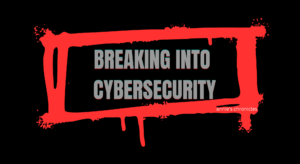Beginner's Guide: Breaking into Cybersecurity
Starting a career in cybersecurity can seem daunting, but it’s a field brimming with opportunities and challenges. For absolute beginners, the path to a successful cybersecurity career involves more than just obtaining a degree. When I first decided to pursue a career in cybersecurity, I was overwhelmed by the sheer volume of information and the steep learning curve. I started with online courses, then moved on to my degree, but quickly realised that practical experience was crucial. I began participating in CTF competitions and found a mentor through BCS. With their guidance, I pursued entry-level certifications and obtained a masters degree in computer science, which landed me my first tech job and gave me invaluable hands-on experience. Now, I’m a cybersecurity professional who is still constantly learning and growing in this exciting field.
Here’s a guide I’ve put together so that you can get started and stand out in this dynamic field.
1. Understanding the Basics
Get Informed: Before diving into formal education or certifications, familiarise yourself with the basics of cybersecurity. Resources like online articles, blogs, and introductory courses on platforms like Coursera, edX, and Khan Academy can be immensely helpful. Understanding key concepts such as encryption, firewalls, malware, and network security is essential.
Explore Various Fields: Cybersecurity is a broad domain with several specialisations including network security, information security, penetration testing, and security analysis. Spend some time exploring these fields to determine which aligns with your interests and strengths.
2. Formal Education
Pursue a Degree: While a three-year degree in computer science, information technology, or a related field provides a strong foundation, it’s often not enough on its own. Ensure your coursework includes subjects like network security, cryptography, and ethical hacking.
Join Student Organisations: Many universities have clubs or organisations focused on cybersecurity. Joining these can provide practical experience, networking opportunities, and additional learning resources.
3. Entry-Level Certifications
CompTIA Security+: This is a great starting point for beginners. It covers essential principles for network security and risk management, and is well-recognised in the industry.
Certified in Cybersecurity (CC): (ISC)² is generously offering free training, course materials, and exam vouchers for CC to the first one million eager learners. Despite the rapidly growing demand for cybersecurity professionals, the talent pool remains relatively small.
Certified Ethical Hacker (CEH): For those interested in penetration testing and ethical hacking, CEH provides a good starting point by teaching how to think like a hacker.
4. Practical Experience
Hands-On Labs: Use platforms like Cybrary, TryHackMe, and Hack The Box to practice your skills in a safe and controlled environment. These platforms offer a range of exercises from beginner to advanced levels.
Internships and Volunteer Work: Seek out internships, even unpaid ones, to gain real-world experience. Volunteering for cybersecurity projects or participating in Capture The Flag (CTF) competitions can also be invaluable.
5. Networking and Mentorship
Join Professional Associations:Organisations like (ISC)², BCS and ISACA offer student memberships, which can be a great way to network with professionals, attend conferences, and access additional resources.
Seek Mentors: Finding a mentor in the field can provide guidance, advice, and support as you navigate your cybersecurity career. Use LinkedIn, professional forums, and local meet ups to connect with potential mentors.
6. Continuous Learning
Stay Updated: Cybersecurity is an ever-evolving field. Regularly read industry news, follow cybersecurity blogs, and participate in webinars to stay updated on the latest trends and threats.
Advanced Certifications and Degrees: As you progress, consider advanced certifications like CISSP, Certified Information Security Manager (CISM), and Certified Information Systems Auditor (CISA). Additionally, pursuing a master’s degree in cybersecurity can further enhance your credentials.
Starting a career in cybersecurity requires dedication, continuous learning, and practical experience. By following these steps, you can build a strong foundation and set yourself apart in the competitive job market. Remember, the journey might be challenging, but the rewards and opportunities in cybersecurity are well worth the effort. So, gear up, get certified, and start your path to becoming a cybersecurity expert!

